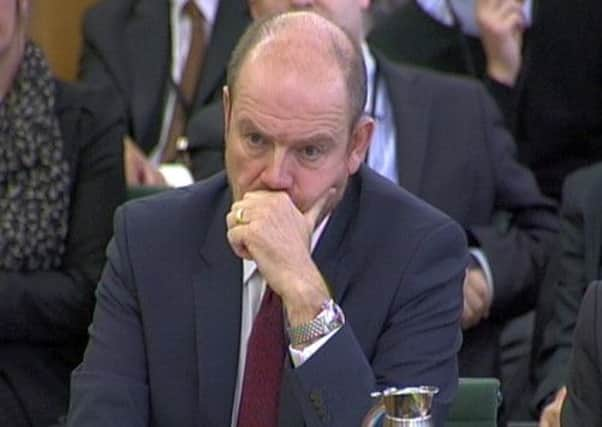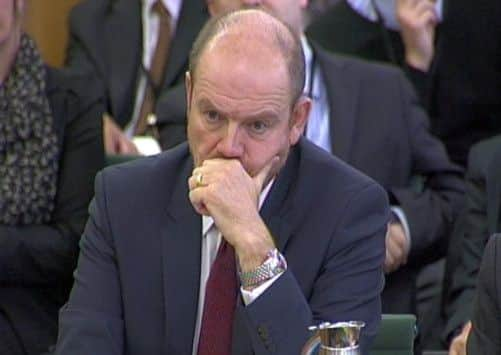Incompetent BBC is now broke says MP


Former director-general Mark Thompson, one of seven witnesses called by the Public Accounts Committee, was forced to deny a charge that the BBC had “lost the plot” when it gave a pay-off of almost £1 million to his former deputy, Mark Byford.
MP Margaret Hodge, who chairs the committee, told those present that the meeting was a “grossly unedifying occasion which can only damage the standing and the reputation of the BBC”.
Advertisement
Hide AdAdvertisement
Hide AdShe said: “At best, what we’ve seen is incompetence, lack of central control, a failure to communicate for a broadcaster whose job is communicating.


“At worst, we may have seen people covering their backs by being less than open. That is not good.”
Earlier in the hearing, she asked Mr Thompson why Mr Byford needed an extra payment when he was contractually due around half a million pounds, saying: “Why was £500,000, which is for most people mega bucks, not enough?”
The BBC’s HR boss, Lucy Adams, also came under fire after she said the payment was part of a plan to cut numbers of senior staff without causing too much disruption - leading Ms Hodge to tell her: “This attitude that the top cadre of people at the BBC faced greater difficulty when they faced redundancy rather than a receptionist or someone lower down is offensive, just offensive.”
Advertisement
Hide AdAdvertisement
Hide AdIn another heated exchange, Ms Hodge told Ms Adams: “I’m not having any more lies this afternoon.”
The HR boss, who announced last month she was quitting the BBC, told MPs at an earlier hearing she had not seen a note detailing plans for pay-offs to Mr Byford and marketing boss Sharon Baylay - but later admitted helping to write it.
Following the suggestion that her evidence should be taken with “a pinch of salt”, Ms Adams said such an inference was “grossly unfair” and she had been confused about what document the committee was referring to.
She said she “immediately” clarified the issue, but then admitted not telling the committee until September 2 after giving the mistaken evidence on July 10.
Advertisement
Hide AdAdvertisement
Hide Ad“It’s a very funny interpretation of immediate,” Ms Hodge said.
In another barbed comment after Ms Adams asked to see a leaked email in which she allegedly referred to a severance package as a “sweetener”, Ms Hodge said: “You are developing a habit, Ms Adams, of changing your evidence after the hearing.”
“That’s unfair, that’s really unfair, madam chairman,” Ms Adams said.
Mr Thompson told the committee that in his view Mr Byford’s severance package represented “value for money” and said he had been under “ferocious pressure” from the Trust to make savings by cutting senior staff.
Advertisement
Hide AdAdvertisement
Hide AdMarcus Agius, former chairman of the BBC executive board remuneration committee, also described the pay-off as “value for money”.
But Ms Hodge told the former banker the committee “were astounded you took that view”, saying: “The shareholders of the BBC are the licence fee-payers and I cannot for the life of me see how you can justify these levels of redundancy payments.”
Mr Thompson said the decision for Mr Byford to leave the BBC with a total payout of £949,000 was part of a move to axe senior executives which would give the BBC annual savings of £19 million and he believed he “had the full support of the BBC Trust” to order it.
Ms Hodge said people were looking at BBC management in “dismay” and asked Mr Thompson if the BBC had, under his management, lost the plot.
He said: “I do not think we lost the plot.”
Advertisement
Hide AdAdvertisement
Hide AdHe said he had inherited a way of doing things at the broadcaster, telling MPs: “I did not loosen the financial controls in this area.”
In written evidence published ahead of today’s meeting, Mr Thompson accused BBC Trust boss Lord Patten and trustee Anthony Fry of ‘’fundamentally misleading’’ committee members at a previous hearing when they told MPs that members of the Trust were not always included in decision-making.
Mr Thompson said he stood by his claim, adding: “I don’t understand why those misleading comments were made.
“I don’t want to impute intention to it but I believe there were damaging and unfair misleading statements made specifically on this point.”
Advertisement
Hide AdAdvertisement
Hide AdLord Patten said he took the charge of misleading the committee “very strongly” and said his induction to the job included no references to severance pay and a media briefing he was given before the publication of the annual report said pay-offs to Mr Byford and former marketing boss Sharon Baylay were “contractual payments”.
He said: “I’m in the position in which I’m accused of having misled the committee on something I didn’t know and couldn’t have been expected to know.”
Nicholas Kroll, director of the BBC Trust, drew gasps from MPs when he said he was not “closely involved” in the preparation of a note on October 7 2010 explaining the Byford payment.
The executive, who is paid £238,000, conceded the pay-off was “unquestionably a large figure” but a matter for the BBC executive board remuneration committee and not the Trust.
Advertisement
Hide AdAdvertisement
Hide AdMs Hodge told him: “There is not one person around the table who can understand why there was no challenge from you.”
Lord Patten said he wanted more time to prove the governing structure of the BBC could work and said there was “a cultural issue” of high pay that had to be dealt with and apologised for.
But Ms Hodge said the evidence suggested the governance of the BBC was “broke”.
She said: “We all around the table feel it is broke. What are you going to change?”
Advertisement
Hide AdAdvertisement
Hide AdLord Patten cast doubt on any move that would see communications watchdog Ofcom regulate the corporation, saying: “I can’t imagine handing the regulatory power to Ofcom and Ofcom wanting to be involved in remuneration.”
Former chairman of the BBC’s board of governors Lord Grade said the corporation “suffers more and more from a lack of understanding the value of money”.
He told BBC2’s Newsnight: “The cheque comes in every April, £3.5 billion, and if you don’t have to earn the money and you’ve got that quantity of money it’s very hard to keep a grip on the reality of the value of money.”
Asked if Lord Grade, who was chairman at the time Mr Thompson was hired, said he had been paid too much.
Advertisement
Hide AdAdvertisement
Hide Ad“I benchmarked him against what he was earning at Channel 4 and he came to run the BBC, a much more complex, huge organisation, for less money than he was earning at Channel 4.
“But on reflection maybe we paid him too much or maybe we didn’t bargain hard enough with him over his salary.”